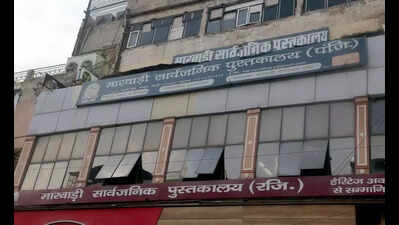New Delhi: As you walk down the bustling road in Chandni Chowk, it’s hard to notice the Marwari Sarvajanik Pustakalaya located above the popular Haldiram’s eatery unless one is actually looking for it. Located across Gurdwara Sis Ganj Sahib, the reading oasis can be accessed through an aged, mirrored door and a narrow stairway.Inside, there’s a typical library setting, the atmosphere silent with the people in the room absorbed in their books and newspapers. Further inside, the wall facing the reception area reveals the relevance of this place. It showcases the institution’s historical importance through framed notes from historical icons like Mahatma Gandhi, Bal Gangadhar Tilak and Madan Mohan Malviya. These share a cozy presence alongside Delhi Development Authority’s ‘Heritage Library’ recognition certificates.The public library in old Delhi holds immense significance in India’s independence movement, the receptionist said in a low tone, pointing to the proof provided in an anachronistic visitors’ book, which contains ink signatures and written messages from luminaries of the age of national ferment.Founded by freedom fighter Kedarnath Goenka, a Marwari merchant in 1915, the Sarvajanik Pustakalaya was a common rendezvous for revolutionaries during India’s fight for freedom. “In the evenings or on certain days, the place became a meeting place where freedom fighters and intellectuals discussed independence,” said Raj Narayan Shroff, member of the founding family of Marwari Charitable Trust, which runs the library. “Goenka, who was inspired by Gandhian ideals, invited Mahatma Gandhi to the library for the first time on Nov 27, 1917.”Apart from Gandhi, many others, among them Tilak, Malviya, Vijay Laxmi Pandit, KM Munshi, Aruna Asaf Ali, Ram Niwas Mirdha and Chaudhary Brahm Prakash, the first chief minister of Delhi, visited the place. Renowned Hindi poets and writers, including Ramdhari Singh Dinkar, Maithili Sharan Gupt and Harivansh Rai Bachchan, also came to the library.Prem Singhania, president of the library and dispensary run by the trust, added, “When Goenka joined the Indian National Congress, he inspired the Marwari community, mostly businessmen, to contribute to the freedom struggle and to the running of facilities that would educate people about their rights. Today, this place serves as a treasure trove for scholars seeking printed Hindi resources from the early 1900s.“Wooden platforms in the corners once held stacks of prominent Hindi and Urdu newspapers, allowing visitors’ unlimited reading time at no cost. Shroff noted that the collection later expanded to include magazines and books, with a focus on Hindi literature.The building, spread across two floors, previously showcased Victorian architecture with distinctive white pillars. Today, it has a contemporary look, divided into two distinct areas — one designated for readers and the other housing its substantial book collection of over 35,000 books, including 22 old manuscripts and numerous historical volumes, serving book enthusiasts, historians and competitive exam aspirants alike.“Our collection has the manuscripts of Shri Dadu Vani, Bhrigu Samhita, chronicles of the Agarwal Samaj and the Lok Sabha proceedings from the 1960s,” said Abhishek Ganediwala, who looks after the library operations. “These valuable documents are preserved with utmost care and protection. We also maintain an extensive collection of periodicals such as Hans, Stree Darpan, Chaand, Dharmyug and encyclopaedias.“Since 1956, the Marwari Charitable Trust’s associated families have overseen four educational and healthcare establishments, including a senior secondary school established subsequently on Nai Sadak. The trust has launched a fresh initiative supporting students preparing for competitive exams. This programme enables students to borrow essential books at no cost if they submit a recommendation letter from their educational institutions.Trilok Chand Goenka, representing the third generation of the founder’s family, expressed appreciation for those who supported the trust’s ongoing mission. “While we didn’t have enough funds to open a senior secondary school, Seth Ram Lal Khemka offered us land free of cost and the trust bore the construction expenses. To date, both primary and secondary schools are providing free education to 500 students. The dispensary works for six days and offers free consultancies and medicines,” he said.Throughout its hundred-year existence, the trust members took on the challenges, remaining committed to the educational facility. “Although a conventional library in appearance, the pustakalaya’s extensive collection is a valuable resource for international universities, academics and research scholars,” said trust member Pradeep Gupta. “The facility began serving the public in a period when libraries were scarce in the region. Today, the strategic location near the metro station has transformed it into a preferred destination for children, who come every day to access books without being charged any fee.”The library has also been the venue of social initiatives, prominently the Nagari Pracharini Sabha and Hindi Sahitya Sabha. In recent years, it has hosted meetings focused on the cleaning of the Yamuna, according to Gupta.
